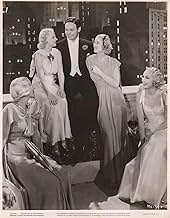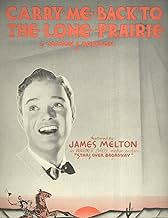Al is a down-on-his-luck promoter who is thinking of taking the final bow when he meets singing porter Jan. He sees something in Jan so he signs him to a contract. Al works odd jobs to pay f... Read allAl is a down-on-his-luck promoter who is thinking of taking the final bow when he meets singing porter Jan. He sees something in Jan so he signs him to a contract. Al works odd jobs to pay for Jan's singing lessons and drops the idea of Opera when he learns that it will take year... Read allAl is a down-on-his-luck promoter who is thinking of taking the final bow when he meets singing porter Jan. He sees something in Jan so he signs him to a contract. Al works odd jobs to pay for Jan's singing lessons and drops the idea of Opera when he learns that it will take years. He has him sing in a nightclub and from there it is up. But Jan soon starts missing les... Read all
- Mustached Man at Champ's Table
- (uncredited)
- Man Wanting Testimonial
- (uncredited)
- Jim Flugel
- (uncredited)
- Man in Church
- (uncredited)
- Charlie
- (uncredited)
- Listener in Italy Montage
- (uncredited)
- Man
- (uncredited)
Featured reviews
O'Brien is Al McGillevray, a broke manager, who, as he's contemplating suicide, hears a porter sing and decides to take him on. The tenor's stage name becomes "Jan King," and his rise to fame is a bit too fast. He starts to enjoy his social life and the accompanying alcohol more than the high notes. Adding to the problem is that Al has fallen for an ambitious young singer (Jean Muir) who wants him to manage her.
O'Brien does a great job as a man trying to work out his life and what it is that he really wants. The surprise for me here was Jane Froman, whom I only knew from the film "With a Song in My Heart," in which she was portrayed by Susan Hayward. Froman is not only absolutely gorgeous, but her lush voice is equally beautiful (I did at least remember that she was a wonderful singer). In 1943, she was in a horrible plane crash and almost had to have her leg amputated, though she kept on entertaining. Why she wasn't featured in films more before her accident is beyond me.
The career trajectory of the tenor in the film actually matches James Melton's, minus the booze. He started out as a popular singer, but during the Depression, his kind of high, bright singing voice went out of style and was replaced by the more baritone sounds from the likes of Bing Crosby and Russ Columbo. Already classically trained, Melton returned to his operatic roots, eventually making his debut at the Metropolitan Opera as Tamino in "The Magic Flute." Tamino would be a signature role for him at the Met, and he also performed the tenor roles in Lucia, Don Giovanni, Mignon, La Traviata, and Madama Butterfly during his 8 years there. Melton continued to have a great career later in concerts and clubs. He was very pleasant looking and a nice personality, so it's no wonder he was picked up for films, however briefly. In the movie, he sings several songs that were mainstays of his concerts as well as "Celeste Aida," in which he sounds fabulous.
Entertaining, and if you like beautiful singing, you'll enjoy "Stars Over Broadway."
O'Brien wants quick results, though, and betrays him, making him a more popular-style singer who can rake in the bucks. He does and stardom goes to his head but he takes to the sauce, betraying O'Brien in return.
This is not the first time I've seen O'Brien in a role that suggests gay or closeted gay feelings. The reconciliation between these two is strange indeed for a scene between two men in a mid-thirties movie.
O'Brien wants to make a star of Jean Muir, too, but Menotti hears her "Ave Marie" sung in church and doesn't think she has the goods. She and O'Brien end up together but the movie is really about his and Melton's characters.
It is dark and quite elegant, a touching movie whose title has little to do with it and is misleading. Perhaps O'Brien smiles once but if so, it is the exception rather than the rule. His performance is subdued and he seems beaten down.
Columbia made a successful opera star film, now everybody got into the act. Twentieth Century Fox signed Lily Pons, Paramount inked Gladys Swarthout, MGM had Lawrence Tibbett for awhile. Nelson Eddy made the only real transition from grand opera to Hollywood.
Anyway Warner Brothers signed Metropolitan Opera tenor James Melton and I have to say he had a very pleasant voice and a personality that was easy to take. He's a bellhop who's voice comes over into Pat O'Brien's room as down on his luck theatrical agent O'Brien is contemplating suicide. Not an uncommon thing in the Depression as people became paupers overnight at times.
The rest of the film is the trials and tribulations Melton and O'Brien go through. The song Melton sang, Carry Me Back to the Lone Prarie, a cowboy ballad became a staple item during his concerts.
Another interesting piece of trivia is that the song September in the Rain was cut from the finished film. You can hear it played in the background. It was sung in another film by James Melton called Melody for Two and became a popular hit for him.
Jane Froman is also in the film and it's interesting why she never became a film star, except really in her own autobiographical film, With a Song In My Heart where she sings with Susan Hayward lipsynching. She had the looks and the voice. Who can tell about these things.
I recommend this film highly so people can get to hear what a couple of real good singers are like from the thirties. Especially Melton. I happen to have a few recordings of him and he has an infectious lilt in his voice. The only film that's really available for people to see him in is The Ziegfeld Follies where he and Marion Bell sing an aria from La Traviata. It was a good number, but Melton did so much more than that.
This is not my kind of music. I don't want that to influence my review, but it does not help. I can do without this Pat O'Brien character and I don't find Melton that good as an actor. He's obviously a better singer. I actually like the comedic side characters. They save little moments within a rather bland movie.
The story starts out in a bar with down-on-his-luck agent/talent scout Al McGillevray (Pat O'Brien) being the butt of jokes at every table he visits in the joint. Disheartened, he goes back to his hotel and requests his trunk be brought up to his room, saying he's going to check out. He is - but not the way the night clerk thinks as Al has a gun in that trunk and plans to end it all. He changes his mind when happy singing porter Jan King (James Melton) arrives with his trunk and Al thinks he can make him into a sensation and finally become a big shot which seems to be his highest goal in life.
Al takes odd jobs in order to pay Jan's expenses during the weeks it takes for Jan to take some basic voice training from Professor Minotti, and then Jan makes his debut. Minotti wants to take Jan to Italy for lengthy training so that he can sing opera, since he has that potential. This doesn't mix with anxious Al's desire to drag Jan to the top as fast as possible so he can go around town crowing that he discovered him. What is dragged up fast can be dragged down in a hurry too, as Jan begins to be more interested in wine and women than song. Throughout all of this, there is the presence of a demure young woman, Nora, who wants to be a singer. She is constantly asking Al if he'll be her agent, and for some reason that's not clearly understandable, he keeps refusing. Things come to a head between Jan and Al when Jan not only is trashing his own career but is planning on making Nora another notch in his belt.
This one is a little light on dramatic enjoyment but I have to take my hat off to Pat O'Brien's acting here. His character starts out a weakling who is willing to end it all over nothing more than foolish pride, but by the end of the film I really admired the guy. On top of that there's some beautiful singing by James Melton in one of his very few film appearances of the 30's.
Did you know
- TriviaMarie Wilson's first credited screen role.
- SoundtracksAt Your Service, Madame
(1935) (uncredited)
Music by Harry Warren
Lyrics by Al Dubin
Played during the opening credits
Also played when Freddy is introduced to Al and Jan at Witmark's
Performed by James Melton, Jane Froman and chorus
Details
- Release date
- Country of origin
- Languages
- Also known as
- To paidi tou dromou
- Filming locations
- Production company
- See more company credits at IMDbPro
- Runtime
- 1h 29m(89 min)
- Color
- Sound mix
- Aspect ratio
- 1.37 : 1








































